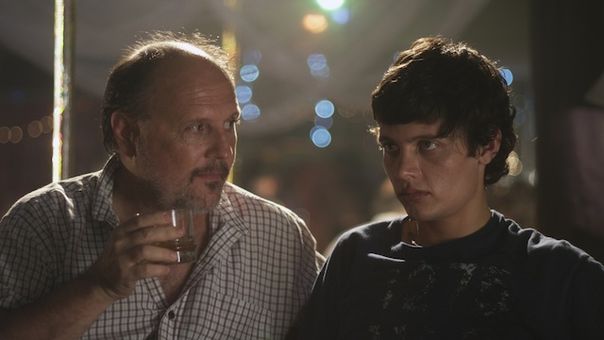Adolescence in a Small Town
Claire Lee of the 2014 Talent Press reviews the Argentinian film THE THIRD SIDE OF THE RIVER, which was produced by Martin Scorsese and features in the Berlinale Competition.

Celina Murga's THE THIRD SIDE OF THE RIVER
THE THIRD SIDE OF THE RIVER, a film by Argentinian filmmaker Celina Murga, is a coming-of-age tale exploring the universal father-son relationship. A teenager hates his father, but he still finds himself following in his footsteps. And in the rural Argentinian town where he lives, everyone knows everyone else, only making things more difficult for the young protagonist.
Produced by Martin Scorsese, the film, featured in the Berlinale Competition, was shot in Murga’s native province of Entre Rios – north of Buenos Aires. The film’s seemingly peaceful small-town scenery contrasts sharply with the grim face of 17-year-old Nicolas (Alian Devatac). He seems bored, angry, and sometimes even murderous. Everyone in town knows the secret that he struggles with. They all know, but pretend they don’t: Nicolas’ father, a respected doctor, Jorge (Daniel Veronese), has two families – Nicolas, his siblings and their mother – are not Jorge's socially recognized family. Jorge rarely visits them, and when he does, it’s usually just to have sex with Nicolas’ mother.
In a number of scenes, Nicolas and his siblings spy on their father. The camera follows the young characters’ eyes, when Nicolas’ little brother peeks into his mother’s bedroom while she’s having sex with Jorge, and when Nicolas watches Jorge at a distance while they are, in fact, talking to each other on the phone. The camera work is almost voyeuristic; we see Jorge through his children’s eyes. The children see Jorge, but they hardly talk to him, and fail to form any bond. This is true of the whole town, where privacy is limited. People see and people know, but they don’t talk about what they know.
Nicolas loves his siblings and mother deeply. Jorge wants him to follow in his career footsteps, and Nicolas can only obey. But rejecting Jorge would also mean hurting his mother, who doesn’t want to lose Jorge in spite of the fact that he mistreats her. What do you do when your own desire conflicts with those of the ones you love? It’s hard not to feel for Nicolas and his emotional turmoil. Yet what’s more interesting in the film – more so than the father-son narrative – is its study of adolescence and privacy. Nicolas rarely speaks, yet the world knows his secrets, making him feel even more isolated. THE THIRD SIDE OF THE RIVER captures the essence of human loneliness, which touches us all.

